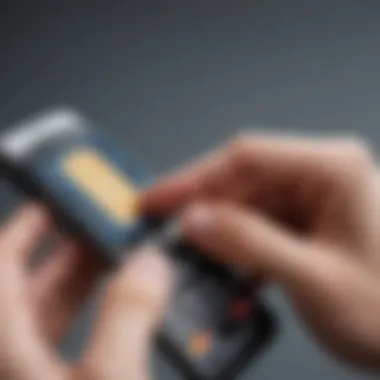Unlocking Mobile Phones: The Ultimate Comprehensive Guide


Intro
Unlocking mobile phones has become an essential consideration for many users seeking flexibility and freedom in their device choices. This comprehensive guide aims to unpack the various aspects involved in the unlocking process. As mobile technology advances, users often find themselves tied to specific carriers, limiting the potential of their devices. Understanding the implications, methods, and legalities surrounding unlocking can empower users to make informed decisions. This article is tailored for young professionals, families, and students who wish to navigate the world of mobile phones efficiently.
Overview of Mobile Unlocking
Definition
Mobile unlocking refers to the process of removing the software restrictions set by a carrier, allowing a device to use different networks. This can be beneficial for users who wish to switch carriers or explore better plans that suit their needs.
Key Features
- Carrier Freedom: Once unlocked, a mobile device can connect to other networks, providing users with the ability to change carriers easily.
- Flexibility: Users can utilize local SIM cards while traveling. This often results in significant savings on roaming charges.
- Device Value: An unlocked phone generally holds a higher resale value, as it appeals to a broader audience.
Purpose and Benefits
The primary purpose of unlocking is to maximize the use and value of a mobile device. The benefits include:
- Increased Options: Users can choose from various carriers, seeking the best plans or services available.
- Enhanced Portability: With an unlocked phone, individuals can enjoy seamless connectivity while moving between different places.
- User Satisfaction: Greater control over device usage can elevate the overall user experience.
Understanding Mobile Phone Locking
Mobile phone locking is an essential topic in today's technology-driven world, especially for those seeking to use their devices to the fullest potential. Understanding how these locks work is crucial for maximizing device utility. It empowers consumers to explore different carriers, optimize costs, and travel without restrictions in connectivity.
What Does it Mean to Unlock a Phone?
Unlocking a phone refers to the process of removing restrictions imposed by the original mobile carrier. A locked phone typically operates exclusively on one network, limiting users' options. Unlocked phones provide the flexibility to switch between carriers by utilizing different SIM cards. This capability can be advantageous when travelling abroad or looking for better service deals.
Emerging technology and consumer demand have made unlocking increasingly relevant. Many people need to know this process to avoid unnecessary costs and enhance their mobile experience.
Types of Mobile Phone Locking
There are various types of mobile phone locks, each serving its purpose and functionality. Understanding these types can help users make informed choices regarding their mobile devices.
Carrier Lock
Carrier lock is a common form of locking imposed by mobile network providers. This type of lock restricts a device to work exclusively with a specific carrier’s network. Many consumers opt for carrier-locked phones due to subsidized pricing with contracts. The primary appeal is that users can afford the latest devices without paying the full price upfront.
However, the downside is evident when users wish to switch carriers. Carrier locks can create frustration if they move to a different area with better service from another provider. The unique characteristic of this lock is its focus on network exclusivity, which, while beneficial, often leads to limitations for the user.
SIM Lock
SIM lock is another locking method that ties a device to a particular SIM card. This type of lock allows users to only use specific SIM cards from the carrier that sold the phone. SIM locks limit global usage as well, affecting travellers who need local SIM access during trips.
The key advantage of SIM locks is network security for manufacturers and carriers. However, they can be a hindrance for users who wish to experiment with different service providers or need to adapt their phone to new locations. The unique aspect of this lock makes it important in the discussion around unlocking phones.
Network Lock
Network lock is somewhat similar to carrier and SIM locks, but it often involves locking a phone to a network's specific infrastructure. This means that a phone may only work on that network even with a compatible SIM card from another carrier.
While this can ensure optimal performance for certain devices on a designated network, it poses significant challenges when users want to switch carriers or take their devices abroad. The convenience of a locked network can quickly become a burden if circumstances change, leading to a growing interest in unlocking methods.
Understanding these various types of locks is vital for anyone looking to navigate the complexities of mobile phone usage. Each lock type has its implications, making it essential to be informed about the choices available.
Reasons for Unlocking Mobile Phones


Unlocking mobile phones is becoming increasingly significant in today's globalized and technologically driven world. The ability to use a mobile device across various networks and borders is crucial for many users. This section delves into the main reasons why individuals pursue unlocking their phones, detailing specific scenarios that highlight the benefits and considerations involved.
Traveling Abroad
When traveling abroad, having an unlocked phone can tremendously enhance your experience. Imagine landing in a new country and immediately having access to local networks. It allows you to avoid exorbitant roaming fees imposed by your carrier. By purchasing a local SIM card, users can enjoy cheaper data and call rates. This is especially important for tourists or business travelers who rely on their phones for navigation, communication, and local services.
In practice, before embarking on a journey, one should check if their device is indeed unlocked and compatible with carriers in the destination country. It is advisable to research local providers in advance, ensuring a seamless transition upon arrival.
Switching Carriers
Another prominent reason for unlocking phones is the desire to switch carriers. Users may find themselves unhappy with their current service due to quality, pricing, or customer service issues. An unlocked phone offers the flexibility to change to another carrier without the need to purchase a new device.
Moreover, this freedom to switch not only enhances consumer power but often leads to better deals. Carriers regularly offer promotions to attract new customers. With the ability to choose among different options, users can potentially save a significant amount on monthly bills and improve their service quality. However, it’s essential to consider compatibility with the new carrier to avoid operational issues.
Saving on Costs
Lastly, unlocking mobile phones can lead to substantial cost savings over time. Locked phones often tie users to specific plans or carriers that may not be the most economical choice. The unlocked phone enables individuals to capitalize on competitive pricing offered by various carriers.
Additionally, many users have reported that they can save money by taking advantage of family plans or special deals from smaller carriers. These options frequently deliver similar services at reduced rates. In this sense, unlocking is not just an option but a strategic decision for optimizing expenses related to mobile communications.
Unlocking your phone provides freedom and flexibility, paving the way towards better choices in terms of service and cost.
In summary, unlocking mobile phones supports international travel, enables carrier transitions, and allows individuals to capitalize on financial opportunities. All these factors make unlocking a valuable consideration for many phone users today.
Legal Considerations of Unlocking
Unlocking a mobile phone is not just a matter of technical manipulation; it comes with various legal considerations that every consumer should understand. This section delves into the legal landscape surrounding mobile phone unlocking, focusing on two key areas: the Digital Millennium Copyright Act (DMCA) and the rights and responsibilities of consumers. Navigating these legalities is essential for ensuring that unlocking a device is done in compliance with current regulations.
Understanding the DMCA
The Digital Millennium Copyright Act, enacted in 1998, plays a significant role in the context of mobile phone unlocking. This legislation addresses copyright laws as they pertain to digital content and technology. Specifically, it restricts the circumvention of copyright protection mechanisms. When it comes to mobile phones, this law has created some ambiguity regarding what is permissible in unlocking a device.
While unlocking a phone may be done for personal use, the DMCA outlines that bypassing technical protections could technically be illegal. However, there are exemptions to this rule, particularly when it comes to unlocking phones that are already out of contract or owned outright by the consumer. These exemptions are crucial for consumers who wish to switch carriers or make use of their devices without restrictions.
The DMCA has separate provisions that make it crucial for consumers to stay informed about current laws and exemptions related to unlocking.
Key Points on the DMCA:
- Legal Restrictions: Understand that circumventing security measures can lead to legal issues.
- Exemptions: Keep abreast of the latest updates regarding exemptions for unlocking.
- Consumer Ownership: Unlocking is generally permissible if you own the device outright and have fulfilled any contractual obligations.
Consumer Rights and Responsibilities
As a consumer, it is essential to be aware of both your rights and responsibilities when it comes to unlocking a mobile phone. Legally, consumers have the right to unlock devices they own, but there are conditions.
First, it's important to verify any contracts or agreements with mobile carriers to determine if there are specific clauses related to unlocking. Some carriers may impose restrictions, like requiring the device to be paid in full or to be owned for a certain period before unlocking is permissible. Failing to adhere to these requirements may lead to a breach of contract.
Furthermore, consumers should also consider documentation and support. Keeping clear records and receipts can help assert ownership and assist in any disputes that may arise. If a consumer feels their rights are violated, they can seek remedies through appropriate legal channels.
Responsibilities of Consumers:
- Fulfill Contractual Obligations: Ensure that all conditions set by the mobile carrier are met before unlocking.
- Keep Records: Maintain documentation related to your device ownership.
- Seek Legal Remedies: Understand the steps to take if you believe your rights have been infringed upon.
In summary, understanding the legal considerations surrounding mobile phone unlocking is vital for users wishing to exercise their rights responsibly. Familiarity with the DMCA and consumer rights not only protects consumers but also empowers them to make informed decisions regarding their devices.
Methods for Unlocking Mobile Phones
Unlocking a mobile phone is essential for many users looking to switch networks, or simply maximize their device's capabilities. Understanding the various methods of unlocking helps in making informed decisions and avoids potential pitfalls. Here, we explore different methods, their importance, and the considerations each entails.


Carrier Unlocking
Carrier unlocking is the most straightforward method for unlocking a mobile phone. This process generally involves contacting the carrier that originally sold the device. The carrier will often provide unlocking codes if specific contractual obligations are met.
It is paramount to verify the terms associated with this method. Some carriers may charge fees, while others unlock the device for free after a certain period or under specific criteria. It’s essential to gather all relevant information beforehand to ensure a hassle-free experience.
A significant advantage of carrier unlocking is that it maintains compatibility with the phone’s original software and firmware. This method usually minimizes risks associated with unlocking, such as voiding warranties or damaging the device.
Using Unlock Codes
Using unlock codes is another popular method among mobile phone users. Unlock codes are numerical combinations provided by the carrier or generated through unlocking services. These codes, when entered correctly into the device, unlock its network restrictions.
The process involves a few simple steps:
- Obtain the Unlock Code: This can be done via the carrier or third-party services.
- Insert a Non-Compatible SIM Card: This enables the device to prompt for the unlock code.
- Enter the Unlock Code: Carefully input the code to unlock the device.
While this method is generally reliable, care should be taken since entering an incorrect code multiple times can permanently lock the phone. Thus, it’s crucial to ensure accuracy and relevance of the code before attempting to unlock.
Unlocking Software and Tools
Another method involves using specialized unlocking software or tools. These applications aim to bypass carrier restrictions without needing codes. Some software can perform the unlocking remotely, while others may require the phone to be physically connected to a computer.
Examples include tools like Dr.Fone and iMyFone LockWiper. Keep in mind that while they can be effective, results may vary and compatibility issues might arise. It is also worth noting that navigating through software options requires technical understanding, so users should proceed cautiously.
Using unlocking software often entails specific system requirements. Hence, users should ensure their devices are compatible with the chosen tool.
Professional Unlocking Services
If other methods seem daunting, hiring professional unlocking services is a viable option. These services specialize in unlocking phones and typically offer a safe and easy experience.
Well-rated services can provide assurance of successful unlock, often backed by customer support. However, it is advisable to conduct thorough research to ensure the reliability of these services. Checking reviews and past customer experiences on platforms like Reddit can lead to better service choices.
The primary consideration when opting for professional unlocking is cost. Prices can vary significantly, but understanding the service's trustworthiness is crucial.
Risks and Challenges in Unlocking
Unlocking a mobile phone presents various benefits but is not without its risks and challenges. Understanding these potential pitfalls is crucial for anyone looking to unlock their device. These risks can range from technical issues to legal consequences. Being informed can help consumers make better decisions and protect themselves from unwanted complications during the unlocking process.
Voiding Warranty
One significant risk associated with unlocking mobile phones is the potential to void the manufacturer's warranty. Most device manufacturers have specific policies regarding software modifications. When a phone is unlocked, this is often seen as a modification of the original operating system. Consequently, if the device develops a hardware failure, manufacturers may refuse to cover repairs under warranty. This can lead to substantial costs for the user, especially if the repair is complex or requires replacement parts.
To mitigate this risk, consumers should check warranty terms before proceeding with unlocking. It is also worth noting that some manufacturers provide specific guidelines that allow for unlocking without voiding the warranty. Therefore, understanding the terms and conditions relevant to one's device is vital.
Bricking Devices
Another considerable challenge in unlocking is the risk of bricking the device. The term 'brick' refers to a mobile phone that has become completely unusable due to software corruption during the unlocking process. This may occur if incorrect unlock codes are applied or if incompatible software is downloaded. A bricked phone turns into an object that resembles a brick—non-functional and typically not recoverable.
The technical complexity involved in unlocking often depends on the device model and the method used. Users should be particularly cautious while following unlocking instructions. Detailed research and guidance, possibly from forums or communities on platforms like Reddit or Facebook, are often helpful in reducing this risk.
Legal Repercussions
Lastly, legal repercussions can arise from unlocking mobile phones. While unlocking is legal in many countries, there are still certain regions where this may not hold. Consumers should be aware of local laws and regulations governing mobile unlocking. If the unlocking process involves circumventing security features, it might cross legal boundaries.
In some cases, mobile carriers may take action against users who unlock their phones without permission. This could result in penalties or having one’s service terminated. Therefore, it is important to navigate the legal landscape surrounding phone unlocking carefully. Conducting thorough research into consumer rights ensures that users act within legal boundaries while unlocking devices.


Understanding these risks and challenges can help ensure a smooth unlocking experience, protecting both your investment and your rights as a consumer.
Technical Requirements for Unlocking
Unlocking a mobile phone is not only a matter of choice but also one of technical adequacy. Understanding the technical requirements can significantly ease the process and ensure a successful outcome. This section details the essentials for unlocking, including device compatibility and the necessary software updates.
Device Compatibility
Device compatibility is a crucial aspect of unlocking mobile phones. Not all devices can be unlocked through the same methods. Different manufacturers and models may have their own unique specifications and requirements. Knowing whether your device supports unlocking is essential for a smooth process.
- Check the Model and Carrier: Typically, the first step is to know your phone’s exact model and the carrier it is locked to. Some devices are inherently easier to unlock than others.
- Research Unlocking Options: Not every phone unlocking method works on every model. Researching specific forums or community pages can give insight into which methods have worked for others with the same device. Websites like reddit.com can offer valuable user experiences and tips.
- Look for Official Requirements: Some manufacturers provide unlocking guidelines. These may include eligibility criteria or prerequisites to unlock. Adhering to these requirements is necessary to avoid complications.
Ultimately, device compatibility lays the foundation for all subsequent unlocking steps. Without it, the unlocking process might lead to frustrations or failures.
Software Updates and Requirements
Another key factor in unlocking a mobile phone is ensuring that the device has the necessary software updates installed. Software updates can often play a strategic role in facilitating the unlocking process.
- Keep Your Device Updated: Mobile operating systems frequently receive updates that improve functionality and security. An up-to-date system ensures that your device can effectively communicate with unlocking services and tools. A neglected software could lead to failed unlocking attempts.
- Understand Software Version: The specific software version on your device may have implications for unlocking methods. Certain unlock codes or methods may only apply to certain versions of the software. It is beneficial to know your version, which you can typically find in the settings menu.
- Backup Data Before Updates: Before updating software, back up all important data. Updates can sometimes lead to data loss, so ensuring that your information is safe is vital.
Post-Unlocking Steps
After unlocking a mobile phone, it is crucial to follow several post-unlocking steps to optimize the device's performance. These steps ensure the phone operates seamlessly on the new network and that users can access all functionalities without issues. Failing to take these actions may lead to connectivity problems or underutilization of the phone's capabilities, which can undermine the benefits of unlocking.
Testing Network Compatibility
One of the first things a user should do after unlocking is to test network compatibility. This involves inserting a new SIM card from a different carrier to see if it works correctly. Compatibility testing is vital, as it confirms the device can connect and function on the desired network.
Users should check for the following:
- Signal Strength: Ensure the phone can receive signals from the new carrier.
- Data Connectivity: Test whether cellular data is functional.
- Calling and Texting: Make calls and send texts to verify communication services.
If the phone fails to connect, it might indicate an issue with the unlocking process or network settings. Checking with the new carrier can offer solutions that may require some adjustments or further configuration.
Reconfiguring Settings
Once network compatibility has been confirmed, the next step is to reconfigure settings on the mobile device. This action can enhance user experience and ensure optimal operation. Generally, the following adjustments might be necessary:
- Access Point Name (APN) Settings: These settings must be configured properly to enable mobile internet access. Each carrier has its specific APN.
- MMS Settings: Multimedia Messaging Service settings should be configured correctly for sending and receiving images or videos.
- Network Preferences: Users can select their preferred network type (4G, 5G, etc.). Making these adjustments ensures the phone operates at its best according to new carrier standards.
By taking time to execute these post-unlocking steps thoroughly, users can harness the full potential of their mobile devices, ensuring they are fully operational on a new network.
These steps not only solidify the benefits of unlocking but also empower users to navigate their devices with confidence across various network providers.
Future of Mobile Phone Unlocking
Mobile phone unlocking is evolving, responding to dynamic consumer needs and technological advancements. This section delves into emerging trends and the impact technology has on unlocking practices. Understanding these elements is essential as the mobile landscape shifts quickly. Unlocking a phone now is not just a process, but an indicator of consumer empowerment and technological innovation.
Emerging Trends
One significant trend is the growing emphasis on user autonomy. Consumers increasingly demand control over their devices. This shift is evident as more companies adapt their policies to cater to customer preferences. Enhanced transparency in unlocking procedures is becoming standard practice among carriers. Many customers expect straightforward methods, often turning to online resources to verify the legitimacy of unlocking.
Another trend is the rise of eSIM technology. Traditional SIM cards are being replaced by embedded SIMs, making it easier to switch carriers without physical cards. This technology allows consumers to program their devices with multiple carrier profiles, enhancing flexibility. As this technology spreads, the need for traditional unlocking methods may decrease dramatically.
Moreover, an increasing number of third-party software solutions are available. These tools help users unlock devices without needing professional services. They often offer user-friendly interfaces, guiding consumers through the unlocking process step-by-step. However, caution is advised when using these services to avoid potential issues.
Impact of Technology on Unlocking
Technology plays a crucial role in how unlocking evolves. With each new smartphone, manufacturers often implement more complex locking mechanisms. This complexity aims to enhance security, but it also complicates the unlocking process for consumers. As biometric security measures like facial recognition and fingerprint scanning become standard, understanding the implications for unlocking is vital.
Additionally, the rapid development of firmware updates poses another layer of complexity. Update processes may include changes that unintentionally lock devices or make previous unlocking methods obsolete. Keeping abreast of these changes is necessary for individuals who wish to unlock their devices effectively.
Furthermore, advancements in artificial intelligence are starting to play a role. With AI, it may become easier for software tools to adapt to newer locking systems and help users navigate unlocking processes more effectively.



